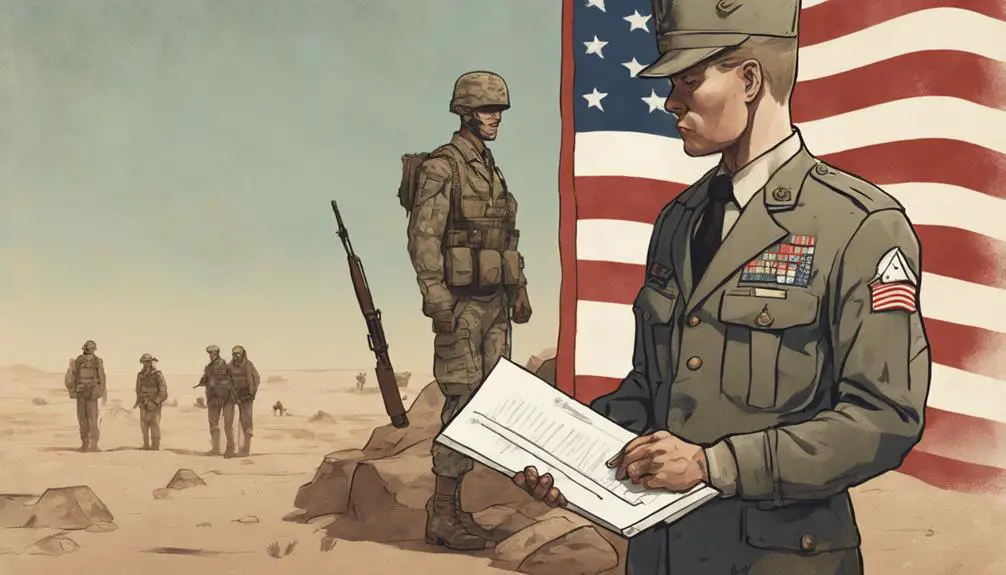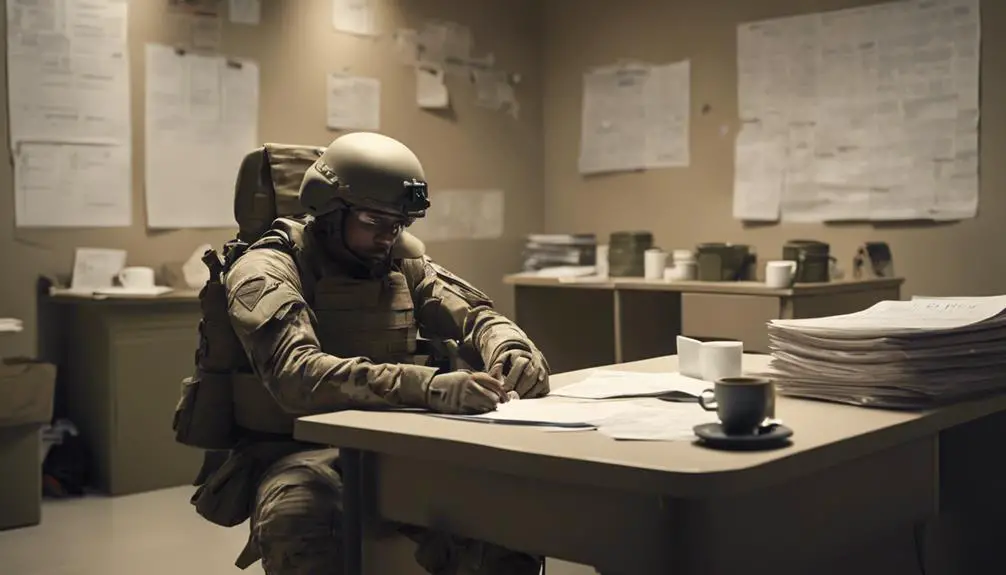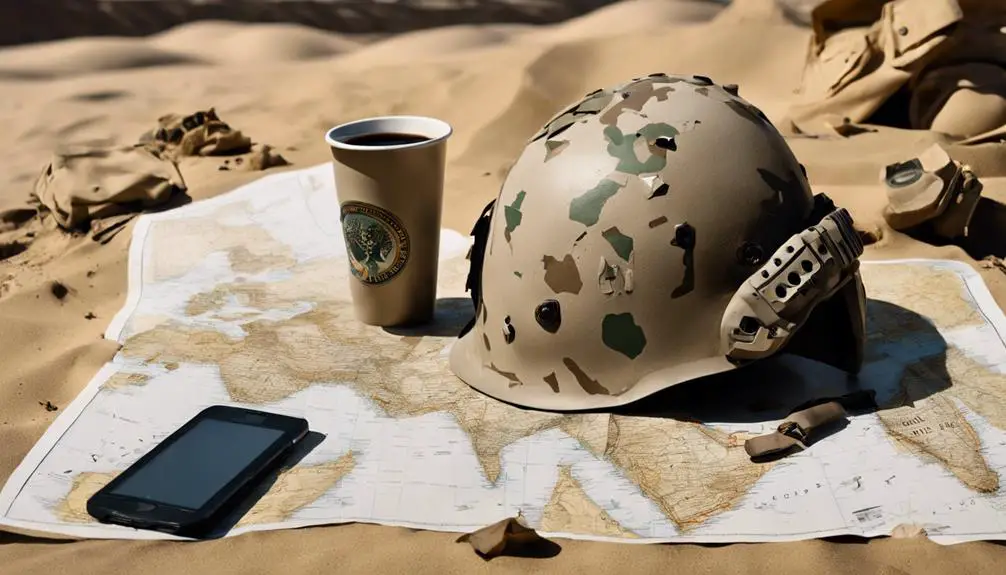You've probably come across the term 'Fobbit' in military slang, but what does it really mean? A Fobbit refers to soldiers stationed at Forward Operating Bases (FOBs) who provide essential logistical support. The term emerged during the Iraq War as a playful combination of 'FOB' and 'Hobbit.' Fobbits are essential to maintaining operational efficiency, but they often face social isolation, mental strain, and stigma. Despite their critical role, they're sometimes seen as not being 'real' soldiers. But without Fobbits, military operations would grind to a halt. Want to understand the reality of life as a Fobbit and their unsung heroism? Look closer.
The Origins of Fobbit Slang

You've likely heard the term 'Fobbit' tossed around by military personnel, but have you ever wondered where this slang term originated? The answer lies in the domain of military linguistics, where colloquialisms and slang emerge as a natural response to the unique circumstances of military life.
In the context of modern warfare, the term 'Fobbit' emerged during the Iraq War, specifically among US military personnel stationed in forward operating bases (FOBs). The slang term is derived from the phrase 'FOB-bit,' a playful combination of 'FOB' and 'Hobbit,' referencing J.R.R. Tolkien's fictional characters known for their comfort-loving nature.
Historical context is essential in understanding the origins of 'Fobbit' slang. The term gained popularity as a way to describe soldiers who rarely, if ever, ventured outside the relative safety of their FOBs.
In an environment marked by danger and uncertainty, the term 'Fobbit' became a tongue-in-cheek way to poke fun at those who remained behind the wire, often performing administrative or support roles.
As military linguistics continue to evolve, the term 'Fobbit' serves as a tribute to the ingenuity and humor of military personnel in the face of adversity.
Life on the Forward Operating Base
As you settle into life on a forward operating base (FOB), the essential realities of war are tempered by the familiarity of routine and the comforts of makeshift amenities. You quickly adapt to the base routines, which provide a sense of structure and normalcy amidst the chaos.
However, daily struggles persist, and you must navigate the challenges of living and working in a war zone. Unit morale is vital, and efforts are made to boost spirits through recreational activities and care packages from home.
Living conditions can be austere, with cramped quarters and limited amenities, but you learn to appreciate the small comforts. Security measures are always a top priority, with patrols and surveillance ensuring the base's safety.
Food options are limited, but you find ways to make the most of the available rations and occasional treats. Despite the difficulties, you find a sense of community and camaraderie with your fellow soldiers, which helps to make life on the FOB more bearable.
The Crucial Role of Fobbits

Fobbits, a colloquial term for support personnel, play a pivotal behind-the-scenes role in maintaining the operational efficiency of the forward operating base. As you navigate the complexities of base operations, you'll realize that fobbits are the backbone of the support networks that keep the base running smoothly. They're responsible for guaranteeing that essential services like food, water, and medical care are available to troops in the field. From logistical support to administrative tasks, fobbits work tirelessly to provide the necessary infrastructure for military operations to succeed.
You mightn't always see them in the spotlight, but fobbits are the unsung heroes of the military. They work behind the scenes to ensure that troops have access to the resources they need to complete their missions. By keeping the base running efficiently, fobbits enable military personnel to focus on their core responsibilities, knowing that their support needs are being met.
As you explore the world of fobbits, you'll come to appreciate the essential role they play in maintaining the operational readiness of the forward operating base.
Challenges of Being a Fobbit
While support personnel are essential to the smooth operation of the forward operating base, they often face unique challenges that can impact their morale and effectiveness. As a Fobbit, you're no exception. You may experience mental strain due to the pressure to maintain the base's infrastructure, ensuring the safety and well-being of combat troops. The weight of responsibility can be overwhelming, leading to anxiety and stress.
Additionally, social isolation can be a significant challenge. You may be stationed in a remote area, far from family and friends, with limited communication options. This can lead to feelings of loneliness and disconnection, making it difficult to cope with the demands of your role.
Furthermore, the lack of social interaction can hinder your ability to develop a support network, exacerbating the mental strain. It's essential to recognize these challenges and take proactive steps to mitigate their impact. By prioritizing self-care and seeking support from colleagues and superiors, you can better navigate the difficulties of being a Fobbit.
The Stigma of Being a Fobbit

Despite your important role in maintaining the forward operating base, you may still encounter a lingering stigma attached to being a Fobbit. This stigma can manifest in various ways, leading to feelings of Fobbit shame and inadequacy. You may feel like you're not contributing to the 'real' war effort, or that your work is less valuable than that of your combat counterparts.
However, it's imperative to recognize that this stigma is largely perpetuated by Rear echelon perception. In reality, Fobbitts play an indispensable role in supporting the war effort, and their contributions are critical to the success of military operations.
Some common misconceptions about Fobbitts include:
- They aren't 'real' soldiers
- They aren't contributing to the war effort
- They aren't exposed to the same level of danger as combat troops
- They're only support personnel, not 'real' warriors
It's crucial to remember that these misconceptions are unfounded and unfair. As a Fobbit, you're an integral part of the military machine, and your contributions are valued and necessary.
Fobbits in Modern Military Culture
As you navigate the complexities of modern military culture, you'll find that the role of Fobbits has evolved to encompass a broader range of responsibilities and increased recognition within the military hierarchy. Gone are the days when Fobbits were relegated to menial tasks and stereotyped as being out of touch with frontline operations. Today, Fobbits play a crucial role in supporting military operations, often working behind the scenes to guarantee the smooth functioning of military bureaucracy.
Despite lingering Fobbit stereotypes, you'll find that modern Fobbits are highly skilled professionals who bring valuable expertise to the table. They're responsible for managing complex logistical systems, coordinating supply chains, and providing critical administrative support to frontline units. In recognition of their contributions, Fobbits are increasingly being acknowledged as indispensable members of the military team.
As you interact with Fobbits in modern military culture, you'll discover that they're more than just administrative assistants. They're problem-solvers, innovators, and dedicated professionals who work tirelessly to support the warfighter. By recognizing the evolving role of Fobbits, you'll gain a deeper appreciation for the complex machinery that drives military operations.
Frequently Asked Questions
Can Fobbits Participate in Combat Operations if Needed?
As you consider participating in combat operations, you might wonder if your role allows for it. In general, personnel with specialized training are prepared for combat readiness.
However, in exceptional circumstances, anyone can be called upon to support combat operations. If needed, you'll receive additional training to guarantee your safety and effectiveness.
While it's not your primary role, you can contribute to combat efforts if required, but your primary focus remains on your specialized tasks.
Are All Support Personnel Considered Fobbits by Default?
You might assume that all support personnel are considered fobbits by default, but that's not entirely true. In reality, not all support personnel are viewed as fobbits.
The term typically carries a negative connotation, implying a Rear echelon mindset, and is often associated with the Fobbit stigma. This label is usually reserved for those who rarely, if ever, engage in combat operations or frontline duties.
Do Fobbits Have Limited Access to Base Facilities?
As you navigate the military base, you're curious about the access rules. Do personnel have unrestricted freedom to roam? Sadly, the answer is no.
You'll find that base privileges come with strings attached. Facility restrictions are in place, limiting your access to certain areas. It's not a free-for-all, and you'll need clearance to enter restricted zones.
Your access is determined by your role and security clearance, so don't expect to wander freely everywhere.
Can Fobbits Be Deployed to Multiple FOBS Simultaneously?
You're wondering if you can be deployed to multiple forward operating bases (FOBs) at the same time.
In reality, it's not common for personnel to be simultaneously deployed to multiple FOBs. However, Fob Hopping, where you're temporarily reassigned to another FOB, might occur.
Remote Deployment, where you're sent to a new location for a specific task, is also possible.
But being permanently stationed at multiple FOBs simultaneously is unlikely due to logistical and operational constraints.
Are Fobbits Exempt From Standard Military Physical Training?
As you consider the physical demands of military service, you wonder if certain personnel are exempt from standard physical training.
In general, military personnel are required to meet specific fitness standards to guarantee readiness. However, some individuals may be granted PT Waivers due to medical or other reasons. These waivers exempt them from standard military physical training, allowing them to focus on other aspects of their role.
Conclusion
As you reflect on the world of Fobbits, remember that they make up approximately 70% of military personnel in a given operation.
Despite their essential role, Fobbits often face stigma and misconceptions. In reality, they're the backbone of military operations, providing necessary support to frontline troops.
As you move forward, consider the critical contributions of Fobbits, and recognize their significance in the grand scheme of military success.







